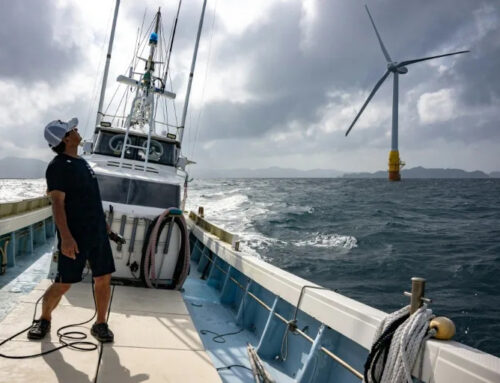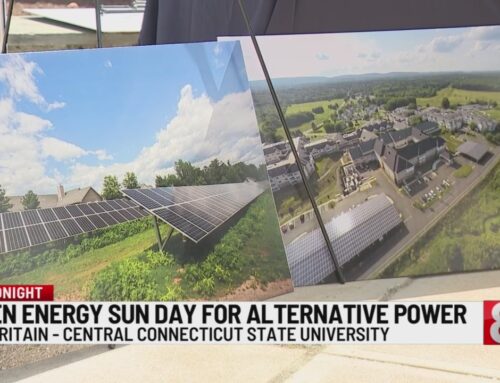Wind farms paid to turn off power in £1bn ‘racket’ pushing up bills
September 21, 2025
The boss of Britain’s biggest energy provider says households are facing higher bills because of a “racket” where wind farms are paid to stop producing power.
There are 2,500-plus wind farms across the UK – mainly in Scotland, Yorkshire and the North East – which are key to Labour’s pledge to decarbonise the country’s electricity sector by 2030, with more planned after prime minister Sir Keir Starmer lifted a ban on new onshore sites in England.
But speaking to The Independent, Greg Jackson, the founder and chief executive of Octopus Energy, said insufficient infrastructure to carry electricity produced by wind farms is forcing them to shut down, which is adding costs to consumers. ,
It is because the National Energy System Operator (Neso) pays wind farms for the amount of energy they would have created when off they have to shut down, and then has to shell out on alternative energy sources, such as from gas-powered stations, to fill the gap on the national network.
Mr Jackson, whose company invests in wind farms and is a leading advocate of transitioning to green power, put the cost of the policy at £1bn already since January this year. This compares to £1.2bn across all of 2024, and £780m in 2023.
Some wind farms are owned by companies that also run gas plants, so they are effectively getting paid twice, he added.
“The system operator looks at a map and they realise there is a bunch of generators that are going to get paid but their electricity won’t get to market because of grid congestion, so they pay them anyway, and then they find someone else to fill the gaps and pay them,” said Mr Jackson. “It is a racket.”
Mr Jackson is named today on The Independent’s Climate 100 list, which recognises business leaders, innovators and advocates who are working to alleviate the impact of the climate crisis. He will also make a keynote speech at our second annual Climate 100 event in New York on Tuesday, part of the city’s influential climate week.
The rise in costs associated with wasted wind power, which Mr Jackson projects to reach £8bn by 2030, are passed on to consumers. Think-tank Carbon Track said the practice added £40 to the average UK household annual bill in 2023. From 1 October households are also facing a £35 rise in the annual energy cap, pushing average yearly bills to £1,755.
Regulator Ofgem has ordered energy projects to speed up electricity grid connections, but Mr Jackson said: “The regulation said ‘if you build the wind farm, until you get the connection we’ll still pay you for the electricity you could have generated’,” he said.
“It’s like building a factory where there no roads and then being paid for what you might have produced if there had been roads… Originally, it was meant to be a short-term sticking plaster, but it has been exploited by companies; and so increasingly, they get their revenue, not from electricity, but from being paid not to generate it.
“These farms could be generating cheap electricity, and instead they are putting our bills up.”
Neso says the cost of so-called ‘curtailment’ where wind farms are paid not to produce power currently amounted to a small proportion of household bills, up to 3.5 per cent.
It warned that with more onshore and offshore wind farms being opened in north and east Britain, the price of curtailment is “likely to increase”, but a spokesperson said improved infrastructure and electricity market arrangements could lead to lower costs for consumers.
Another way to help solve the issue, Mr Jackson said, was for “zonal pricing”, which would see the existing national market broken up into different regions, where the amount paid for electricity depends on local supply and demand.

It would mean the cost of energy in Scotland, where the majority of wind farms are, could fall dramatically, while the prices would likely increase in south-east England.
Supporters said the idea would encourage businesses to relocate to areas close to renewable energy sources and make the electricity grid more efficient. It is also hoped it will lead to more investment in wind farms close to densely populated areas to meet demand.
But the idea was rejected in July by energy secretary Ed Miliband in favour of retaining a single national wholesale price, as he announced a package of reforms including plans to map out new energy projects across Britain up to 2050.
A spokesperson for the Department of Energy Security and Net Zero said the government was investing in new grid infrastructure and reforming planning rules to ensure renewable projects, like wind farms, were built in the “right locations”.
This, the spokesperson said, “will minimise constraint costs and meet the capacity needed to deliver clean power by 2030”.
Yet despite the ongoing investment in clean energy, electricity prices in the UK were almost 20 per cent higher than the EU average in the second half of last year.
Mr Jackson, who rates the UK’s clean energy performance at 5/10, said: “Technology enables dramatically different service delivery for consumers and in many markets that’s happened. In a market like energy, that’s so dominated by incumbents, the lobbying holds back change and consumers suffer.”
Last month, he was appointed non-executive of the Cabinet Office Board. Although he will not be focusing on energy, which would be at “conflict” with his work, he hopes the government can learn lessons from how his company operates.
Octopus Energy, only founded in 2016, has toppled the so-called “big six” to take the biggest market share in the UK, and now has revenues reaching almost $20bn. It is success Mr Jackson puts down to the use of technology to reduce operating costs and improving service.

The company is also pioneering a scheme that has so far seen 5,000 “zero bills” homes, kitted with solar panels and heat pumps, built.
Mr Jackson said: “A lot of what we have done as a company is to combine the use of technology with efficient organisation to transform the way we deliver service and be more agile. Showing them [the Cabinet] how we do it could enable better public services without putting taxes up.”
Climate change is one of the key issues the government must tackle, said Mr Jackson, who added that too many people were being faced with making a decision between the cost-of-living and the climate.
“It is incumbent of politicians and business leaders to relentlessly drive down the cost of climate change so they [the public] don’t face that dilemma.”
However, there are green shoots, Mr Jackson said.
This year, he said the country faced a “tipping point” in the usage of electric cars, with the price of the vehicles now matching petrol alternatives, and two-thirds of people now able to charge their vehicles at home.
The full Climate 100 list can be found at independent.co.uk/climate-100
Search
RECENT PRESS RELEASES
Related Post




